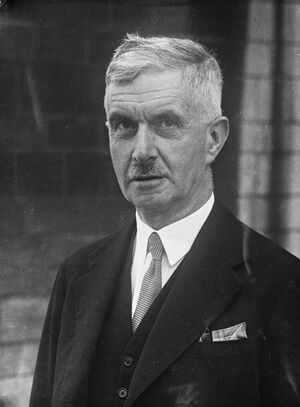James Chuter Ede
 | ||||||||||||||||||||||||||||||||||||||||||||||||||||||||
| Born | Epsom, Surrey | |||||||||||||||||||||||||||||||||||||||||||||||||||||||
| Died | Ewell, Surrey | |||||||||||||||||||||||||||||||||||||||||||||||||||||||
| Nationality | British | |||||||||||||||||||||||||||||||||||||||||||||||||||||||
| Alma mater | Christ's College (Cambridge) | |||||||||||||||||||||||||||||||||||||||||||||||||||||||
| Religion | Unitarian | |||||||||||||||||||||||||||||||||||||||||||||||||||||||
| Spouse | Lilian Williams | |||||||||||||||||||||||||||||||||||||||||||||||||||||||
| Party | Labour | |||||||||||||||||||||||||||||||||||||||||||||||||||||||
UK Home Secretary 1945-51
| ||||||||||||||||||||||||||||||||||||||||||||||||||||||||
James Chuter Ede, Baron Chuter-Ede was a British teacher, trade unionist and Labour politician. He was Home Secretary (interior minister) under Prime Minister Clement Attlee from 1945 to 1951, becoming the longest-serving Home Secretary of the 20th century.
Early Life
Coming from the lower middle class, he is the oldest of two children of a grocer. After graduating from high school, he studied at the Teacher Training Center in Battersea and then studied natural sciences at Christ's College, Cambridge University. The university studies proved too expensive for a student from a modest background, he was forced to abandon them after two years, without a diploma. He taught in primary school from 1905 to 1914, and was an active member of the National Union of Teachers. In 1908 he was elected to the district council in Epsom, under the label of the Liberal Party, then in 1914 he was elected representative of Epsom on the county council of Surrey, and had to leave the teaching profession.[1]
In November 1914, at the outbreak of World War I, he voluntarily joined the East Surrey Infantry Regiment, and was made Lance Corporal. In August 1915 he was transferred to the Royal Engineers military engineering corps, and made a sergeant. It was deployed in France the following month. He disapproves of war, however, considering it as destructive of civilizations and noting that the colossal loans that finance it risk impoverishing future generations. While on leave in 1917 he married Lilian Stephens, a teacher. He left the Liberal Party and joined the Labour Party[1][2]
Entry into Parliament
An unsuccessful Labor candidate in the Epsom constituency in the legislative elections of December 1918, he entered the House of Commons in a by-election in the London constituency of Mitcham in March 1923, defeating the Conservative Minister of Health Arthur Griffith-Boscawen, but lost his seat in the legislative elections in December. He regained a seat as MP for South Shields in the 1929 election, which resulted in the Labor Party forming a minority government led by Ramsay MacDonald. He lost his seat in the elections of 1931, and won it again in the elections of 1935. He was then continuously reelected until his political retirement in 1964[3]
Minister
In 1940 he was appointed parliamentary secretary to the Education Commission under the Conservatives Herwald Ramsbotham and then Rab Butler in the wartime national unity government, led by Winston Churchill. He worked very well with Rab Butler and participated in the creation of the Education Law of 1944 (“Butler Law”) which made secondary education free and compulsory. In 1943 the University of Cambridge, where he had to abandon his studies for financial reasons, conferred on him an honorary degree of Master of Arts. In the 1945 election, Labor won an absolute majority of seats in the House of Commons for the first time in their history. Clement Attlee became Prime Minister, and appoints James Chuter Ede as head of the Home Office in his government. He remained there for six years, during the entire period of this government, that is to say the longest term in this position during the entire 20th century[1][3]
It was under his responsibility that the 1948 Nationality Act was adopted which granted the status of "citizen of the United Kingdom and the colonies" to anyone born in the United Kingdom or in one of the colonies of the United Kingdom or one of the empire's colonies, and allows all such persons to freely enter and reside in British territory. That same year he passed a law on criminal law (Criminal Justice Act 1948) which abolished the penalties of forced labor and flogging.
He tried to restrict the application of the death penalty in the United Kingdom, but his proposal, adopted by the House of Commons, was rejected by the House of Lords. As Secretary of State for the Interior, he therefore agreed in 1950 to the execution of Timothy Evans, sentenced to death for murder. The innocence of Timothy Evans having been demonstrated a few years later, James Chuter Ede therefore campaigned for the abolition of the death penalty and for Timothy Evans to be pardoned posthumously. These will be things done by Labor Secretary of State for the Interior Roy Jenkins in 1964 and 1966 respectively[1]
In 1947 he became deputy leader of the Labor Party. In March 1951 he was made Leader of the House of Commons (that is to say Minister responsible for relations with this chamber) while retaining his post at the Ministry of the Interior. Labor lost power in the October 1951 elections. He was made a companion of honor in 1953. Now a backbench member of the opposition, he left the House of Commons in 1964. He was then ennobled, becoming the Baron Chuter-Ede of Epsom in the House of Lords with a life peer title from January 1, 1965. He died in November of that same year at the age of 83[1].
References
- ↑ Jump up to: a b c d e https://www.oxforddnb.com/view/10.1093/ref:odnb/9780198614128.001.0001/odnb-9780198614128-e-32414
- ↑ https://alumni.christs.cam.ac.uk/james-chuter-ede
- ↑ Jump up to: a b https://www.surreyinthegreatwar.org.uk/story/james-chuter-ede-politician-educationist-and-soldier-1882-1965/